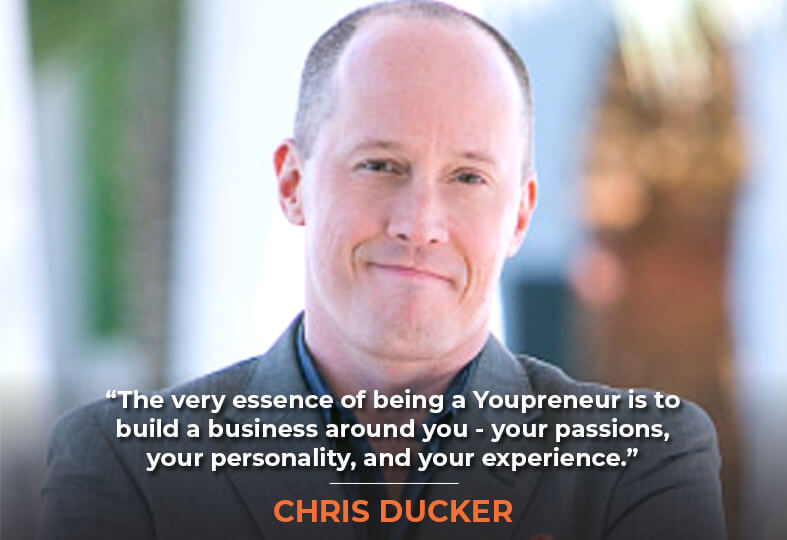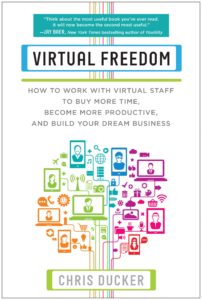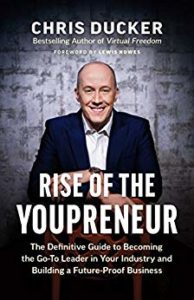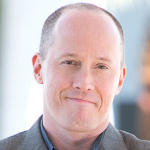The traditional view of the entrepreneur is someone with superhuman stamina who works day and night to get their vision off the ground. For a long time, it was simply accepted as part of the culture that people who wanted to succeed work 14-hour days and spent their weekends buried in spreadsheets and contracts. On this episode number 196, we’re going to hear from a man who embraced this lifestyle 100%, then he realized his mistake. I’m talking about author, podcaster, and entrepreneur Chris Ducker.
Chris was so focused on building his business that he worked long hours and neglected his personal health and family. Then in 2009, he suffered shocking burnout that made him question everything he knew about work. Exhausted, he knew he had to make a change. He overhauled his business, embraced outsourcing, and by 2010, he was working an average of six hours a day and spending more time with his family. Not only was he happier and healthier, but even managed to start a second business while working less. If you’ve ever felt trapped by your own business and wish you could spend more time working “on” your business instead of “in” it, this episode is for you.

Transcript
Chris, it’s so great to have you on the show.
It’s fantastic to be here. Thanks for having me.
It’s been a while since we met in person at Content Marketing World.
A few years. You have more hair and I got less so there goes the hands of time and all that.
Actually, I did have a hair transplant but that was a decade ago.
You’re cheating.
It does actually work.
I think I’ve just come to terms with it now, to be honest with you.
It’s a good look. Tim Ferriss is rocking it. You’re rocking it. I think it works. What’s that movie, The Fast and the Furious?
You’re talking about Jason Statham. Fun facts, completely unrelated to your podcast, but if we’re going to go down this rabbit hole, let’s do it properly. I was walking through Hong Kong airport about a year-and-a-half ago and these two crazy Japanese girls come running up to me thinking that I’m Jason Statham. They’re shouting out things like Hobbs & Shaw. They’ve been calling me The Transporter and all these other sorts of stuff. I’ll be frank with you, I just went with it. I posed for the selfies and everything. I went with it. If Jason Statham listens to your show or watches, sorry, my brother. I had to just go there for a couple of minutes. Give me a break.
That’s fun and cool. This is a good segue to personal branding. Hopefully, you will exceed in your personal brand, Jason, at some point. What is the importance of a personal brand versus a company brand? Our folks are focusing on building the brand and recognition of their company and neglecting their own personal brand. I was in that same boat myself for many years.
I think that personal brand is nothing really new. It’s a little bit of a buzzword, particularly at the moment. It’s been around for a long time and it’s called your reputation. I think things have switched, changed, and pivoted so much over the last 5-10 years. Particularly with doing businesses online where if you want to build a business based around you – your personality, your expertise, and the people you want to serve the most. It’s easier to do it today than it ever has been before. The term personal brand is so much easier to get on board with.
You’ve had people like Brian Clark on your show. You think of Brian and you think of Copyblogger and you think of Rainmaker. There are certain people out there, a lot of people that are out there that will get involved with anything Brian does because Brian’s involved. That’s the power of a personal brand. People ultimately want to do business with other people more so than logos and brands. I’m more likely to buy something from someone if I know, love, and trust them.
In today’s world, we can become known, loved, and trusted much easier than before because we can create content, provide value, show up on video, and help people via podcasts. Overall, although it’s not a new thing, I think it’s a thing that people are now leaning into more and more and more when it comes to building their businesses.
How are you building out your personal brand? Because you’ve done a great job. You’re creating books, summits, and masterminds. I haven’t checked to see if you’re in Wikipedia, but I’m guessing that you probably are.
Here’s a funny thing, I had a Wikipedia for about four or five years ago and then one day it just disappeared. I don’t think there is one out there right now, but it’s not the be-all-end-all of the world. I listen to my audience, to be honest with you, that’s where I focus more than anything else. I’m a big believer in what I call P2P relationships or people-to-people relationships. I listen to my audience, my community, my customers, my clients, my students, whatever you want to call them.
Here’s the big reveal, I just give them what they tell me they want, it’s not rocket science. If people tell me that they love getting together with other entrepreneurs, they get it. They understand what it takes to be an entrepreneur in today’s world, and they love learning within a mastermind – brainstorming, and networking with those people in person. Well, I’m going to give birth to the Youpreneur Summit in London which happens every November. If people say to me that they are comfortable learning how to build an audience and monetize that audience working from home, then I’m going to go ahead and create a product or a course that will tell them how to do that.
The very essence of being a Youpreneur is to build a business around you - your passions, your personality, and your experience. Share on XIf they want to be part of an online community, maybe they can’t travel or they don’t want to travel, and they want the benefit of having that geographical support and accountability of hundreds of people around the world. Obviously, I’m going to go and create something like the Youpreneur Academy, which is our online community for people doing that. I think the key here, above and beyond everything else, is that your audience, your customers, your followers, your subscribers—whatever label you give them—they will ultimately shape the way your business grows into the future; it’s just up to you whether you want to listen to them or not. Smart money says, “For me, it’s a good idea.”
How many books have you written and how many do you have in the works?

I always got them in the works. You probably got 10 in the works, I mean, the number of people that you’ve had on your show, you could write 10 books easy. I have two, which are already out there in the world. My first one, Virtual Freedom, was traditionally published and did very well. It has over 1000 five-star reviews and got a 4.8 rating. I think we’re coming up to 80,000 or so copies of that book sold since it was published a few years ago.
Last year, I launched Rise of the Youpreneur, which is my second book, which is the manifesto of the world of the Youpreneur so to speak. We self-published that book because I want it out to market faster. When you traditionally publish, it will take 12-18 months after you signed a deal to get that book public, maybe even longer. I wanted it out faster and I wanted it to be more current. But likewise, the very essence of being a Youpreneur is to build a business around you, your passions, your personality, and your experience. Therefore, I wanted to use myself as a bit of a case study, if I’m to be honest.

If I can publish a book and sell a whole bunch copies, then anyone can do it. That book is a year old now. I think we’re at around 30,000 or so copies sold across paperback, Kindle, and audio which is great. Two books, at least two more in the works. I’ve also got plans to start leaning a little bit into a newer project that I’m launching here in the UK sometime next year which will be aimed towards younger entrepreneurs—literally, kids—trying to help and develop the next generation of entrepreneurs as well.
That’s cool. I taught my kids entrepreneurship when they were young. I have a daughter who really got into internet marketing, she was 14, and she started building websites that were about her passions. Neopets was a big thing back in the day, so she built a fansite about it and monetize it with Google AdSense. She started speaking at conferences like BlogHer at 16 years old. Now, she’s almost 28 and has a whole set of SEO clients. She got her own agency and she was on MSNBC last year talking about SEO.
That’s great. Congratulations! You did a good job there. That’s good.
Thank you. My youngest is an entrepreneur as well but not on the internet marketing space at all. She ended up creating a mobile piano teaching business and has clients all throughout Southern Orange County.
They’re doing what they like doing. They’re enjoying their work and they’re providing a service to their favorite type of clients, good luck to them. Whether they’d become multi gazillionaires or not, enjoy what you’re doing, do it for the right reasons for the right people and everything will work out just fine. I’m a big believer of that.
What’s the angle for this book about kids and entrepreneurship?
I want to make a gazillion dollars. It is about trying to get the next generation of entrepreneurs ready to go and fired up. Understanding the fact that the world needs entrepreneurs more so today than ever before. It needs innovators, thinkers, and leaders. Whether you’re 8 years old or 38 years old, even 68 years old, if you’ve got a great idea to provide a solution to somebody’s problem, then you have to get it out into the world. You’re being a little selfish if you don’t, that’s my attitude on it.
We’re still in the early stages of planning and things like that, but the plan is to maybe start off with a short series of books. They’ll be fun and a little comedic but they’ll have great stories and lessons to be learned behind them. I’m doing my very best to get my 10-year old boy involved in the project but he’s being reluctant. He’s a little tough to get involved in some things. Whereas if you ask him to go and put together an adventure playground in the garden, he’ll be out all weekend doing that. He’s a little tough to deal with certain things.
My daughter has just graduated from university. She’s 21. I’m really looking forward to seeing what she does. She’s actually going to be joining the company on the first of June this year, so that’s exciting. She’s coming on board with our live events, our social media, and whatnot. We’re quite similar. There’s a lot of things in common there, I think.

There’s a new book out from Ray Kurzweil called Danielle. It’s targeting the younger generation and inspiring them to make a world-changing difference. It’s written as a novel. Danielle is the character, who’s the heroine and who’s making a big difference in the world. She’s superhuman, almost like augmented or something. I haven’t read the book yet but I just got a copy. You might want to check that out. It might be inspiring for your kids. Let’s go back to these two books that you have published already, Virtual Freedom, which I have read most of but not all of a while ago. I found it excellent. One of my favorite aspects of that book is The Three Lists to Freedom Exercise. Do you want to share that with our listeners and explain the importance of it?
Actually, this was a self-inflicted exercise, for lack of a better term. In late 2009, I burned out. We had been building the business since 2004, we’re talking four or five years of 15-hours a day, six days a week, except for a couple of little breaks here and there. One morning—without dramatizing it at all—I woke up and I physically couldn’t get out of bed. I was absolutely exhausted. My wife was extremely concerned. She called for an ambulance and I was taken to hospital. I was put on liquids. I was ultimately diagnosed with acute exhaustion and dehydration.
That very quickly slipped into depression, and I was on antidepressants for a very short period of time to get over that – to help me sleep, rest, and all that kind of stuff. I did bounce back, and by the end of the year, I was feeling much better. Between Christmas and New Year, we went away, just my wife and I. We were living in the Philippines still at the time—although we went back to England, here in Cambridge. At the time, we were still there—we went away, and we said, “No devices, no computers, nothing at all.”
We need to go away and figure out a way to be able to ultimately replace me inside of the business day-to-day because we didn’t want what had just happened to happen again. We went to a gorgeous resort in the Philippines and spared no expense; we acted like kings and queens, and all the rest of it, spa treatments every day, the whole thing. I’m now getting into it. And now I’m thinking, “I want to do this all the time. Why be in the office?”

As we were bouncing around the resort when we’re having dinner or sitting at the bar having cocktails or even at the breakfast room or whatever. I take these from hotels all the time—this one’s from the Conrad in London, I’m holding it up—these little notepads are sitting next to the phone in the bedrooms. We were walking around, and by the time we were done, we had lots of different notes where we jotted down ideas, wants, needs, don’t wants, dislikes, and things like that. We started putting them into piles and we noticed that they were very clearly going into three tiles. This exercise that I did ended up being The Three List to Freedom.
The first list was a list of all the things that I didn’t like doing. The stuff that I procrastinated on all day long and I would drag and drop on the digital calendar. That was the first list. The second list is a list of all the things that I struggled doing. I was okay with them but I struggled. I didn’t necessarily dislike them but I wasn’t very good at certain things. I was managing the IT department but don’t ask me to look inside a computer because I’ve got no idea what’s going on. That’s how much of a micromanager I was before I burned out. That was the second list—the list of all the things that I was struggling doing but I was doing them because my business was demanding them of me.
The third list was probably the most exciting one, which is a list of all the things that I felt like, as the business owner myself, that I shouldn’t be doing. There’s a list of stuff that I felt like, “I shouldn’t be doing these; my time should be better spent working on other things,” like spending more time with my top 20% clientele or coming out with new products or initiatives or going to conferences to network and get new clients or whatever it was.
There you go, the three lists of freedom exercise were born. It fundamentally changed my life. I don’t use those words in any way, shape, or form lightly. We hired eight people in 2010 to replace me in that business day-to-day, we tripled our revenue and doubled our workforce. That company after 11 years of rocking and rolling pretty much hardcore every single day, is continuing to make some multi seven-figure revenue. Clearly, it was the right thing to do at that time.
Many people have trouble letting go. They think that they are the best or the only person who can do a particular task, they’re fooling themselves, of course. But what do you tell that person?
That’s what I call superhero syndrome. We talked about that inside the Virtual Freedom as well. I tell them that, “You might think that you’re the only one that can do it. You might think that there are no people out there that can do that task better than you, but the fact of the matter is, quite frankly, you’re wrong. You’ve got to get out of your own way. You’ve got to stop believing your own BS. You need to be able to learn how to delegate.” Because burnout, in that scenario, is not a matter of if, it’s just a matter of when; you will burn out, it will hunt you down, and take you in the middle of the night. There’s nothing you can do to avoid it if you continue to push yourself at those levels. I don’t care how much you go to the gym or how good your diet is or whatever. The fact is, burnout is inevitable. We must try to avoid it more so today than ever, you know what I mean?
Burnout is not a matter of if, it’s just a matter of when. Share on XI know, first hand. I had several episodes of burnout in my 20 years in SEO. There is one time where I had to take a six months sabbatical because I was just done.
It’s real. That’s why I take two 10-day breaks; one in the last quarter of the year and then another one at the beginning of the second quarter of each year, and then in August, we have the entire month off. I take two holidays with my wife, just the two of us, and then in the summer in August, it’s a time for nothing, but family, fun, and games. Not to mention the fact that obviously, I only work four days a week, I haven’t worked on Friday for five years, and I work from basically, [10:00]-[4:00] PM pretty much, Monday to Thursday, that’s pretty much it. All those things certainly helped to avoid it. I don’t want to burn out again, never.
Is that one of the first things that you have folks do if they work with you, to do the Three List to Freedom exercise?
It is the first thing. Nowadays, as I’m focusing more on personal brand growth and personal brand business, ecosystem buildout, and things like that. We still get our coaching clients to do the Three List to Freedom. Here’s a funny statistic, we realized that around about 70% of the people that consume our content or buy our products or come to our live events, about 70% of them would clause themselves as an intermediate entrepreneur. In our world, that means I’m making five figures a month plus, so it’s $10,000 a month plus, call it six figures a year for lack of a better simple mathematical equation; but 80% of those people believe that they are at the beginning of that personal branding journey.
It’s very exciting. Majority of these people are in their 30s and beyond, they’ve got 20 years of solid experience in one particular industry or niche under their belt. They’ve got all these knowledge that people will gladly pay for to download from their brains and their memory and experience banks into theirs but they don’t know how to monetize that. It’s very exciting to work with those type of people, but at the exact same time, these are people that a large majority of them have at least a small team of people. You’d be surprised how many people need to hire to be able to take things up to the next level. So, The Three Lists, definitely right at the beginning of everything.
That forms the executive assistant’s primary job duty’s list.
Either the executive assistant or at least a lot of the people that we work with are online entrepreneurs or online business owners, so maybe it’s an online VA that they need. They’re doing things like updating their social media, that’s important. Don’t get me wrong, to be seen and discovered and to spread your message, but if you’re running a business that’s making six figures a year, you should not be updating bloody Twitter, that is not what you should be doing. What you should be doing is spending time with your high-end clients, your mastermind clients, developing courses, coming up with great ideas for content, podcasts, YouTube, etc.

It’s not saying, “Game of Thrones Season Eight sucked, what do you guys think about that?” Just in case a whole bunch of Game of Thrones fans starts coming down on me on Twitter, I haven’t watched the season yet. I’m a binge-watcher. I’m just going on what I have seen on Twitter so don’t crush me yet, not quite.
You know, I haven’t seen a single episode of Game of Thrones and I don’t intend to.
I think it’s one of those things where you’re either into it or you’re not. I kind of avoided it, and then my wife got very much into season one. She said, “This is great. You should watch it. You’d love it.” She’s my wife, I listen to her, or I reap the repercussions of that. Clearly, I watched season one. I did get into it but I’m a binger. I don’t like to wait an entire week in between watching TV episodes, so I wait for it to finish and then I binge just when I get the chance.
Spoken like a true addict. I’m with you on this Twitter thing or any other social platform where it just sucks you down this rabbit hole of not being in your gift and not being in your unique ability. I have my team manage my Twitter. I have no idea what I’m tweeting. I’m tweeting seven or eight times a day. They completely drive that. I don’t approve anything, I don’t review anything, and I have no idea what I’m tweeting about. They use my Pocket for my Twitter posts. Are you familiar with Pocket?
I love that tool, getpocket.com. Interesting articles and YouTube videos and so forth, I just drop into Pocket. They have access to my Pocket account, and then I’ll dig through that. There are probably thousands of things in there.
You say you don’t really know what they’re tweeting, but you’re obviously giving them the folder to go ahead and do what you need to do there. I love that.
Just only some folders.
At least you’ve got a rough idea in terms of what’s going out and things. It’s important to hold onto that little bit of authenticity I think when you’re “automating” something like that. Kudos to you for at least getting involved in some capacity. Because there’s a lot of people that don’t and they put these automatic tweets out and all the rest of it. I remember like it was yesterday, I was sitting in a hotel room in San Diego when a terrorist decided to drive off of Westminster Bridge in London and kill a lot of pedestrians a few years ago. At the exact same time, somebody made a joke about, “London Bridge is falling down,” via Twitter. Obviously, an automated tweet and everybody just ripped into this guy. There’s a lot to be said for automation and delegation and things like that. But if you’re not using head to be able to figure out as when that automation should be switched off, then more for you.
Never compare your 10th or 12th step to somebody's 100th. Share on XI make sure that my team gets my values and my vision and that’s reflected in my Twitter, in all my social platforms and my email newsletter. Which I also don’t have any involvement in even though it’s written in my voice based on stuff that I find interesting. Again, usually from my Pocket account. But they’ll find stuff that I’ve never even known about at all. Once in a great while, I’ll go scroll through my Twitter feed and find, “That was really cool, I had no idea about that quote, that particular resource, that book, that article or whatever.” They find that sort of stuff all the time. The Pocket account serves as a lighthouse or as a guide to the stuff that I think is important and valuable.
I love that, I think that’s great.
How are you handling your Twitter, Facebook, Pinterest, and all that other stuff?
I don’t do Pinterest. I don’t have an interest in Pinterest. My clientele are on Pinterest. I mean, there might be a little bit of crossover, but I’m a big believer of less is more. It’s a mantra that we live by across the board both family and business. You don’t need a whole bunch of stuff to have a great lifestyle. We’re not minimalists. I don’t believe in doing anymore than is really necessary to get great results. Twitter, much like you, I have very little to do with it, my team runs it for me.
They also pick up on certain things that I might share on one platform that I do run myself, and that is Instagram. I love Instagram. I love everything about it. I like the profile grid. I like the stories. I don’t have anything to do with the IGTV option on there, but it’s by far where I get the most amount of engagement with my community, my followers, and my subscribers. That’s the one that I’m focusing on.
Is my team handling certain bits and pieces on there? Yes, absolutely. Twitter is all but delegated completely, as is Facebook as well. The only time you’ll ever really see me on Facebook is when I’m doing a Facebook live presentation in one way, shape, or form. That’s all we do from social media involvement. We have all of our handles everywhere. We look after our profiles rather on those platforms but we’re not super active anywhere else other than Instagram, Facebook, and Twitter. That’s what we do, and where we do it.
You’re doing your own Instagram, you’re taking the photos, you’re picking the filters to use, and you’re writing the hashtags and all that.
Yeah, almost all the time. I’d say 75% of the time.

I’m going to give you a bit of a hard time here. Is that part of your unique ability or your gift?
Maybe it is, a little bit, I guess. My feeling about it is that I enjoy doing it. I enjoy engaging with my audience. Instagram is the platform where I see the most engagement from them. It’s where I get the most questions. It’s where I get the most shares and likes for lack of a better term and all that stuff. It’s where my people hang out the most according to what I see. I like the idea that I can share a series of five or six Instagram stories in the morning, and by the time I go to bed, a thousand people have watched them. I like that, that’s fun for me. That’s like giving a virtual keynote on a daily basis.
I’m sure there are people with much bigger audiences out there, but for me, I enjoy it. Therefore, I’m part of the Marie Kondo mantra of sparking joy and enjoying what you do. Instagram when it comes to social, at this moment in time, is the most enjoyable platform. I like to do the majority of it. That might change in the future, but right now, that’s the way it’s been for a good year and a half or so. You can give me a hard time whenever you want. Don’t worry.
Alright. Have you seen the movie Social Animals? It’s on Netflix, it’s really good.
I have not seen it, what’s it about?
It’s a documentary, it’s about how Instagram, in particular, has changed our younger generation.
Oh, hang on. Maybe I have seen this. I might have watched it with my daughter. Was there one girl who was in the mid-teens, whose father was managing her and she wanted to be a model? There were other people as well. I think one girl was getting bullied, I think. Okay, so I have seen it. A very interesting documentary.
What lessons did you take out of that?
First and foremost, I’ve been saying this forever, is not take yourself too seriously in anything you do. For example, at our live events, I get people up on several occasions during the day to get up on stage and have a bit of dance with me. I’m the world’s worst dancer. I want to state that right here, for the record, but this doesn’t stop me from getting up and doing it in front of 400 of my closest friends every time. Not to take yourself too seriously, and not to look in too much in regards to what people say about you. The fact is, you put yourself out on the internet, you’re going to get some strange remarks from time to time in one way, shape, or form. I think you just let it bounce off your shoulder and not really worry about it and whatnot.
Your audience or customers will ultimately shape the way your business grows into the future. Share on XI will say, as a parent, social media, in general, concerns me a little bit. Particularly with the bullying side of things. We used to get bullied in the playground by the big kids, whereas now, kids are hiding behind Instagram and Twitter profiles bullying. You can’t stand up to an online bully like you can a playground bully. You can whack a playground bully, and maybe they’ll leave you alone going forward, but you can’t really do that so much unless you completely ignore it, and a lot of kids can’t do that. It gets worse and worse and worse, obviously.
We have a 10-year-old boy. I and my wife were just talking yesterday about, he’s asking, “Can I get a phone for Christmas?” “You’re 10. You don’t have anyone to call, literally. No, it’s not going to happen.” As a parent, I’ll be frank, I will delay giving him a mobile phone for as long as I absolutely and possibly can because I don’t feel like we’re quite there yet with things like privacy and protection for kids online. We’re getting better but we’re not quite there yet. So I’ll avoid it for as long as I can.
I feel the same way. I would guess that you probably need a couple more years left before you have to cave in.
If that’s the case, then that’s just fine because he’s going to be two years older. I can have a 2-year-old with a better conversation with him about it and so on and so on. There are certain things you can say to a 12-year-old boy, that you can’t say to a 10-year-old boy. I understand where you’re coming from.
It’s a double-edged sword. Social media, I think that’s a great opportunity for personal branding, for getting the word out, and for making a difference in the world.
What I will say is that you use these platforms to spread your message, that’s the most important thing. You utilize them to spread your message and what you want to be known for. You don’t build your business, for example, on a Youtube channel. I see these big YouTubers, got millions of followers. If something worse happens to Youtube tomorrow, they’re done overnight. Likewise, you’ve got a huge Facebook page or a massive Facebook group that you’re managing, and you’re converting people from that Facebook group into your program or whatever it is. One person says something against Facebook’s TNCs, they can rip that group down overnight, and you’re done.
The term I use is, don’t build your home on rented lands; you must always get people back to your website. Your website is a perfect example. You are producing this video and audio content, as a podcaster, but you’re putting it all on to marketingspeak.com. It’s all there. People will come and discover the entire thing. If it will all disappear tomorrow, it will still be there. You would still have your business.
It’s been evolving over time. For example, now, I do long-form blog post out of each episode instead of a separate transcript. People don’t love reading transcripts. They’re just not that riveting. If you transform that into a blog post and then add a lot of imagery to break up the text and some click to tweets and so forth, mix it for a very valuable content piece that they didn’t have to consume on audio or video format.
Not to mention the fact that you see a lot of people from a content marketing standpoint, you’ll always get people that have absolutely no interest in listening to your show, but they might like to read the value bombs that you drop on the show with your guests. Likewise, there might be people that will never listen to it or never read it but would love to watch it. I think you’re doing it right. Clearly, you’ve been doing it for long enough to know better.
It’s an evolution for sure. Almost four years.
Good for you, man. Consistency is one of the biggest things that I see with my coaching clients. Consistency is key, it’s everything. You got to show up, every Monday, Tuesday, Wednesday, or Friday. Whatever it is. You got to show up every single week. Every single time you say you’re going to be there, you got to turn up, and you got to show up. You got to do it for a long time, and a lot of the time, before you get any kind of traction. 99.9% of the people on the internet are not going to go viral. Therefore, it’s important to appreciate the fact that the consistency, hard work and value that you bring, that’s ultimately what’s going to differentiate you from the people that are here to try and make the quick buck. People with a BS antenna are way more sensitive today than they were three years ago, five years ago, ten years ago. People are going to tell the good guys and the bad guys much easier ways.
What would be an example—something in your life or business—where you’re stuck with it, just a hard slog and you haven’t really broken into the upper echelon with that thing? It hasn’t really hit it, stride yet, but you’re still on it.
It’s a good question. Some people might disagree with this, but I would say maybe possibly even our podcast, Youpreneur.FM, I mean, we’re at seven million downloads which is a big number, don’t get me wrong, but when I sporadically look at say, iTunes rankings, I tend to not worry so much about vanity metrics or some things like that. But when I look at it and I’m like, “Oh my gosh! We’re 111 this week.” Or, “Wow, we’re only #70 this week.” I feel that we’ve been around long enough that I’ve got enough great content, that I’ve got enough good subscribers base to be in the top 20 of all business podcast on a weekly basis, but clearly it doesn’t work that way.
Not everybody saw Pat Flynn. Pat is my best buddy on the planet, we’ve talked a lot about that stuff. I think the big thing to understand here is that you are serving. As we would say here in England, “If your knicker’s in a twist,” —I think in America you say, “Your panties in a bunch,” or something like that— “If you get your knickers in a twist about these things, you’ll stop.” If you don’t want to stop, you must continue because you are serving a certain community or a certain niche of people. Because of that, it’s important that you continually show up and that you provide value.
I think the podcast is, number one, it’s something I love doing myself. I think it’s great. I love to talk and I love to be with other people. I’m definitely a talker more than a typer. I think that it’s just a natural format for me to be able to provide value to people that are interested in what I’ve got to say. But we’ve never got up to that Tim Ferriss level, and to be frank with you, I’m fine with it. It doesn’t bother me. I never have done and I never will compare my 10th or my 12th step to somebody’s 100th. It just won’t happen; it’s not in me to do that or be that kind of person.
Makes sense. I agree.
I do it every now and then.
Consistency is key, it's everything. Share on XIt’s easy to get caught up in ego or hubris of like, “I’m only going to do it if I get positive feedback or if I get some feedback.” If you get crickets, it can be really demotivating, but you got to push through it because you are making a difference.
The other thing also is that 80% of any community would be lurkers. The numbers don’t lie; they are what they are. You know that 20% of the people that are commenting, sharing, reviewing, tweeting, all that sort of stuff, they’re what you call the superfans. They’re the ones that just love everything you do, and they want to tell the world about it. Fantastic! We need those folks. But there are another four times of those people, that is just in the background consuming, and maybe word of mouth sharing that you don’t see online.
You shouldn’t be too worried about the crickets from time to time. As long as the numbers show that people are downloading and reading and that sort of other stuff, then you have to continue what you are doing. I often say to my clients, which are true blue experts, some of them, in their niches, I say to them, “You’re being selfish if you stop,” because people want to listen. They want to hear from you. They want to see you. If you stop, you’re doing them an injustice. You say you want to serve and help people, but if you don’t show up for them, if you decide, “Oh, I’m not getting enough retweets this week. I’m going to quit,” then you’re being a little selfish.”
It’s true. Do you have a framework for how you walk your clients through personal branding and how to build their profile across platforms, across different channels, and so forth like speaking, writing?
Absolutely, I do. It makes up the book. It makes up the Rise of the Youpreneur. That’s exactly what it is. When you use the word definitive in a subtitle of a book, you better show up. You can’t put a word like that on the subtitle of the book and not have it be the be-all and end-all.
We developed actually, via the Youpreneur Academy, which is our online membership platform. I noticed over the first 18 months of launching that membership, people were actually self-identifying based on what they were watching and consuming and likewise, what they were talking about in our private forums. They were self-identifying into three buckets. It was the building section, or the marketing section, or the monetization section of the model. That is it, man. The entire thing is built up around that entire build market, monetize model now.
For less than $20, you go to Amazon, you can get in the MBA in building a personal brand business model. It’s right there, I wrote the book. But I think the most important aspects of that are, defining who you are—that’s right at the beginning of the journey—once you figure out who you are, what you want to be known for and the value that you can bring to the world, amazing things can happen.

I recently read a book on the Japanese philosophy of Ikigai. I’m going to use this Venn diagram to describe it. It talked about what you’re great at, what you enjoy doing, plus, what the world needs from you. There’s that little section in the middle, that sweet spot, that’s your business, right there.
Once you define who you are, what you want to be known for, everything becomes so much easier. It really comes down to just figuring out—a little bit like the Three Lists to Freedom—figuring out what you’re really good at, what you really enjoy doing at one hand, and then the flip side of that coin is just being real with yourself and saying, “I suck at these tasks. I’m not going to do them anymore. I’m going to focus on the stuff I’m really good at and what I enjoy doing.” That’s going to be my incubus building a really successful business. Whereas everything else can be delegated, everything else can be handed off to people.
We spend so much of our waking hours at “work.” Why would you want to be unhappy doing what you’re doing for that time? I don’t understand why people start moaning about Monday morning and all. Even business owners, quite frankly, who are moaning about what’s going on in the business, the crappy client that they hate dealing with or the product that drives them nuts because there’s a 10% return rate.
I kid you not, I was doing a book signing in New York the year before last, a New York Times best-selling author was there at that party. And they came up to me—as I was signing a book for somebody—and said to me, “Don’t you just get tired of it all? The non-stop, will you sign it? It’s so boring.” I looked at them, and I just thought to myself, “Are you mad? I live for this stuff. I live for it.” If you’re that person, you’ve got it all backward. I really feel we’re in this position, in our lifetime as a human race, where you don’t need to do stuff that you don’t want to and you don’t like to, particularly as an entrepreneur. Do stuff that you enjoy. That’s really the incubus of building that personal brand. It is to ultimately figure out what you enjoy doing, what you want to be known for, and working out who you’re going to help.
I think it’s important to know this one distinction though, that doesn’t mean that you just can’t let it, go to see it or not, get addressed in the business. If it’s an important part of your business, whether it’s bookkeeping or certain social channel, whatever, that’s where your audiences are hanging out, you need to address it. It might not be you personally, but someone in the company needs to take functional ownership of that.
Couldn’t agree more. Absolutely.
How does somebody take the next step in building their personal brand? Of course, they pick up your book, the Youpreneur. Also, you’ve got your Youpreneur Academy. Where do they find that?
youpreneuracademy.com. That is to clarify it’s not a course per se, there’s a lot of learning material in there. It’s very much an online community. We don’t do Facebook groups or anything like that. If you think of the Facebook group being, the analogy I use is like the cocktail bar where you go to hang out after work. The Youpreneur Academy and the community that’s attached to that is like the boardroom. It’s where the real business people come to hang out. That’s the academy.
Obviously, we have the Youpreneur Summit which takes place in London every November, which is a two-day annual conference. That, to me, is a highlight in my calendar. In addition to the dancing on stage, horrifically badly in front of everybody, I love the ability to be able to introduce some of my close friends like Todd Herman, JJ Virgin, Hal Elrod – all keynoting this year. In the past, we’ve had Jay Baer, and Greg Hickman—people that have been on your show before, I know.
Yep. I think every single one that you named is either on this show or on my other one.
There you go. That stage is really the be-all, end-all in the UK and Europe for anybody in our business who wants to learn and mastermind. We’ve got 42 different countries represented in terms of attendees of that event. It’s not a UK event just for UK people, we have people from around the world coming. It’s easily my favorite thing to do every year.
Don’t you also have a mastermind or some sort of think tank?
Yes. We have the round table, which is my kind of circle masterminds, the high-end mastermind group, this 10 people that I’ve worked with every year as part of that. They’re the top 5% of the 20%. They’re kind of the high-end clients. Next year, we’re going to be launching we’re very excited about, it is called the Youpreneur Incubator. We’re going to be launching it actually at this year’s Summit. We have very limited spots, probably about 150 or so people. That will be an in-person mastermind which will take place every quarter in the city of London but we’ve got people coming in literally from all around. I think 56 people have already got deposits. We’ve invited certain pockets of our community to kind of pre-reserve prior to the launch in November at the Summit.
I believe that’s going to be the one that I developed now more than anything else going forward. I love the round table and I love that intimacy. But honestly, I feel like I’m being a little bit cold without getting too mushy, to help a big number of people. I think the Incubator is going to be able to afford me to do that. We’re going to be meeting up four times a year in person. There are going to be special guests who love to mastermind. There are going to be a big workbook that everybody goes through. It kind of takes everything that they’re doing up to the next level. Masterminding and I are quite synonymous with each other. I mean, running them since 2011, and I love bringing good minds together.
Awesome. If you need a special guest too, who happens to be an expert on SEO, I might know somebody.
There you go. Let me know if you know anyone.
Thank you so much, Chris. This was a lot of fun and illuminating, I’m sure, for our listeners. Your personal website, chrisducker.com, is also a great destination for them to check out as well to see how you have shaped your personal brand for yourself.
We’re going through a big design change for that site. We haven’t updated the design of that site since 2014. It doesn’t look dated.
We were a little ahead of the curve. We actually got copy quite heavily in the first year or two after it got updated. But now, I feel like we need to give it a little fresh like paint. That’s second place right now. It will be live firstly in the next six to eight weeks.
Yep. I’ve got a redesign in the process as well for stephanspencer.com.
There you go. It’s the digital version of a hair transplant—look at it like that.
That’s right. Thank you so much, Chris. Thank you, listeners. We’ll catch you on the next episode of Marketing Speak. In the meantime, have a fantastic week.
Important Links
- Chris Ducker
- Youpreneur Summit
- Youpreneur Academy
- Youpreneur.FM
- Youpreneur Incubator
- Virtual Freedom
- Rise of the Youpreneur
- Instagram – Chris Ducker
- Facebook – Chris Ducker
- Twitter – Chris Ducker
- Brian Clark – previous episode
- Content Marketing World
- Tim Ferriss
- The Fast and the Furious
- Jason Statham
- Hobbs & Shaw
- The Transporter
- Copyblogger
- Rainmaker
- Wikipedia
- Neopets
- Google AdSense
- BlogHer
- SEO tips: How to raise your business’s ranking online – Chloe Spencer
- Ray Kurzweil
- Danielle
- Ikigai: The Japanese Secret to a Long and Happy Life
- YouTube
- Game of Thrones Season Eight
- Game of Thrones
- Getpocket.com
- Marie Kondo
- Social Animals
- Netflix
- Pat Flynn
- Amazon
- Venn diagram
- New York Times
- Todd Herman
- JJ Virgin
- Hal Elrod
- Jay Baer
- Greg Hickman
- stephanspencer.com
Your Checklist of Actions to Take










About Chris Ducker
 Chris Ducker is a serial entrepreneur, keynote speaker and author of the bestseller, “Virtual Freedom”. Originally from the UK, Chris has lived in the Philippines for 15-years, where he hosts the annual Tropical Think Tank mastermind event and has founded several businesses, which combined house over 400 full-time employees. He is also a popular business blogger and podcaster at ChrisDucker.com and founder of Youpreneur.com, an exclusive entrepreneurial community. Follow Chris on Twitter @ChrisDucker.
Chris Ducker is a serial entrepreneur, keynote speaker and author of the bestseller, “Virtual Freedom”. Originally from the UK, Chris has lived in the Philippines for 15-years, where he hosts the annual Tropical Think Tank mastermind event and has founded several businesses, which combined house over 400 full-time employees. He is also a popular business blogger and podcaster at ChrisDucker.com and founder of Youpreneur.com, an exclusive entrepreneurial community. Follow Chris on Twitter @ChrisDucker.







Leave a Reply